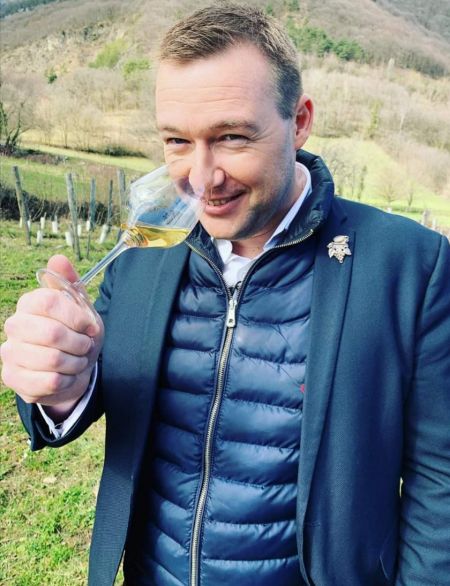 |
INTERVIEW - GAËTAN BOUVIER, MEILLEUR OUVRIER DE FRANCE SOMMELIER 2022, EXPERT AT INSTITUT LYFE AND RESTAURANT MANAGER AND HEAD SOMMELIER OF THE SAISONS RESTAURANT IN LYON
Gaëtan Bouvier passes on his passion to his students and his guests, a passion he nurtures by working from the earth to the palate, which he evokes with generosity |
Catégorie : Europe - France - Carrières
- Interviews et portraits
- Carrière - Interviews
Interview de Vanessa Guerrier-Buisine le mercredi 13 décembre 2023
 Gaëtan Bouvier, Meilleur Ouvrier de France Sommelier 2022
Crédit photo © Institut Lyfe (ex Institut Paul Bocuse)
He sees his profession as one of continuous development and self-improvement, and that's how he shares his passion and knowledge with the younger generation, whom he welcomes as part of his role as wine and beverage expert at the Institut Lyfe, and as restaurant manager and head sommelier at the Saisons restaurant in Lyon, which has one Michelin star.
In an interview with Journal des Palaces, Gaëtan Bouvier talks about the charms of his profession and his unfailing determination.Journal des Palaces: You have won a host of prestigious awards. Aside from the personal challenges, do these titles give you additional legitimacy regarding the students at Institut Lyfe in France? Is it important for a trainer to continue to surpass himself to set an example for the younger generations?Involvement in competitions has given me discipline. When you're passionate about something, dispersion can be detrimental to your effectiveness. I sometimes had to start over three times before certain competitions came to fruition.
Today, I'm continuing my quest for excellence by joining the French Sommelier team to conquer the European and World levels. My sole aim is to acquire the ultimate knowledge and skills so that I can pass them on to my students. It also enables us to share with them certain values and virtues that employers expect. The sommelier profession, when applied with precision, allows you to develop skills that open up unexpected and uplifting horizons.Do you encourage students to enter competitions? What advice do you give them?I tell them it's possible. I share with them in all sincerity the difficult moments of questioning, and the virtuous moments and pleasures that it has brought me. Furthermore, I also pass on the message that winning a competition entails duties and commitments afterwards, and that it's a new beginning, not a finish.
I try to take away their fear of competing. That's often the main obstacle. You never lose a competition.
I like Romain Rolland's phrase: “When you dare, you are often wrong; when you don't dare, you are always wrong”.How would you define the role of the sommelier today?The roles of today's sommelier are : - Conceptualising and implementing a wine and beverage offer in line with the property,
- Sourcing, selecting, tasting and putting together food and wine pairings,
- Working with the head chef,
- Building customer loyalty,
- Communicating and embodying your profession both inside and outside the restaurant,
- Feeding the network of business partners,
- Recruiting and passing on skills,
Budgeting and controlling purchases, sales, margins, and wine and beverage ratios, which account for a third of restaurant sales and 50% of margins.
This is a job where many of the managerial concepts taught in the top schools are applied. This is the richness of the ecosystem and the vision of the Institut LYFE.How has the profession changed recently? How have training methods changed too?Lately, many young women and men have entered this profession. Many start out in the kitchen (which was my case), others in the dining room, and they discover this exciting and rewarding world when they are around 20.
I think that sommellerie is one of the ways of making the dining room profession more attractive again. It's a contagious passion for which no vaccine is needed.
Sommelier training courses in France are excellent. They focus in depth on knowledge and operational aspects. Most of the great sommeliers come out of these courses. Abroad and in the top schools, the approach is more managerial, with a generalist vision and little technical content. The course we are opening next September aims to combine 50% technical and 50% management aspects, with a strong focus on tasting, right through to its scientific approach. There will also be a strong emphasis on immersion.What do recruiters expect of sommeliers today?All the tasks I listed earlier. Today, the younger generation can take advantage of a benevolent awareness of recruiters, who are ready to reward and recognise a person who is responsible for financial performance and for improving the quality of the customer experience. I would have loved to have started my career under these conditions. The wine tourism industry has a considerable demand for the skills of sommeliers.What kind of trainer are you? How do you combine theory and practice? Does the fact that you are the head sommelier and restaurant manager of Saisons facilitate this pragmatic approach and the link with professionals in the sector?The objectives to be achieved are demanding and clearly stated to the students. One of the strengths of our teaching team is that we have the human resources (not the means) to help them see their true level in relation to the objectives and to learn. The fact that we come from the operational world means, I think, that we can organise learning by applying theories. Knowledge in the service of skills is paramount in our approach.
The academic teams at Institut Lyfe are very open and respectful of our professions. This is an opportunity and a great strength. I also sometimes have the impression that it's unique in the world.You yourself own vines of a rare grape variety. Is a relationship with the land essential to being a good sommelier?Even today, I sometimes go to work for winegrower friends. Sometimes, a day with a labourer pruning vines, or taking a baramine to plant and seal an old “franc de pied” grape variety in glacial morène soil can teach you more about climate change than any book or PowerPoint on the subject. It's a sustainable action that consumes no energy apart from my own. These real-life experiences fuel the daily exchanges with our students.What advice would you give to a young person wanting to make a career in the world of fine dining?I'd give them five essential tips for working in one of the finest sectors: - Learn,
- Apply,
- Observe,
- Think,
- Correct.
|
|







